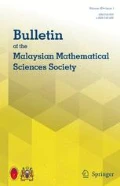Abstract
In this paper, the split common fixed point problem for quasi-pseudo-contractive mappings is studied in Hilbert spaces. By using the hybrid projection method, a new algorithm and some strong convergence theorems are established under suitable assumptions. Our results not only improve and generalize some recent results but also give an affirmative answer to an open question.
Similar content being viewed by others
Availability of data and material
Not applicable.
References
Byrne, C.: A unified treatment of some iterative algorithms in signal processing and image reconstruction. Inverse Probl. 20, 103–120 (2004)
Ceng, L.C., Ansari, Q.H., Yao, J.C.: An extragradient method for split feasibility and fixed point problems. Comput. Math. Appl. 64, 633–642 (2012)
Wang, F., Xu, H.K.: Cyclic algorithms for split feasibility problems in Hilbert spaces. Nonlinear Anal. 74, 4105–4111 (2011)
Xu, H.K.: Iterative methods for the split feasibility problem in infinite-dimensional Hilbert spaces. Inverse Probl. 26, 105018 (2010)
Chang, S.S., Wang, L., Qin, L.J.: Split equality fixed point problem for quasi-pseudo-contractive mappings with applications. Fixed Point Theory Appl. 2015, 208 (2015)
Yao, Y.H., Yao, J.C., Liou, Y.C., Postolache, M.: Iterative algorithms for split common fixed points of demicontractive operators without priori knowledge of operator norms. Carpathian J. Math. 34(3), 451–458 (2018)
Moudafi, A.: A note on the split common fixed-point problem for quasi-nonexpansive operators. Nonlinear Anal. 74, 4083–4087 (2011)
Moudafi, A.: The split common fixed-point problem for demicontractive mappings. Inverse Probl. 26, 055007 (2010)
Censor, Y., Segal, A.: The split common fixed point problem for directed operators. J. Convex Anal. 16, 587–600 (2009)
Ansari, Q.H., Rehan, A., Wen, C.F.: Implicit and explicit algorithms for split common fixed point problems. J. Nonlinear Convex Anal. 17, 1381–1397 (2016)
Boikanyo, O.A.: A strongly convergent algorithm for the split common fixed point problem. Appl. Math. Comput. 265, 844–853 (2015)
Cegielski, A.: General method for solving the split common fixed point problem. J. Optim. Theory Appl. 165, 385–404 (2015)
Kraikaew, P., Saejung, S.: On split common fixed point problems. J. Math. Anal. Appl. 415, 513–524 (2014)
Takahashi, W.: The split common fixed point problem and strong convegence theorems by hybrid methods in two Banach spaces. J. Nonlinear Convex Anal. 17, 1051–1067 (2016)
Takahashi, S., Takahashi, W.: The split common null point problem and the shrinking projection method in two Banach spaces. Linear Nonlinear Anal. 1, 297–304 (2015)
Wang, F.: A new method for split common fixed-point problem without priori knowledge of operator norms. J. Fixed Point Theory Appl. (2017). https://doi.org/10.1007/s11784-017-0434-0
Wang, F.: A new iterative method for the split common fixed point problem in Hilbert spaces. Optimization 66(3), 407–415 (2017)
Reich, S., Tuyen, T.M.: A new algorithm for solving the split common null point problem in Hilbert spaces. Numer. Algorithms (2020). https://doi.org/10.1007/s11075-019-00703-z
Goebel, K., Reich, S.: Uniform Convexity, Hyperbolic Geometry, and Nonexpansive Mappings. Marcel Dekker, New York (1984)
Agarwal, R.P., ORegan, D., Sahu, D.R.: Fixed Point Theory for Lipschitzian-type Mappings with Applications. Springer, New York (2009)
Tan, K.K., Xu, H.K.: Approximating fixed points of nonexpansive mappings by the Ishikawa iteration process. J. Math. Anal. Appl. 178, 301–308 (1993)
Funding
This work was supported by the Natural Science Foundation of China Medical University, Taiwan. This study was also supported by the National Natural Science of China (No. 11361070).
Author information
Authors and Affiliations
Contributions
All the authors contributed equally to the writing of the present article. And they also read and approved the final paper.
Corresponding author
Ethics declarations
Conflicts of interest
The authors declare that they have no competing interests.
Additional information
Communicated by Rosihan M. Ali.
Publisher's Note
Springer Nature remains neutral with regard to jurisdictional claims in published maps and institutional affiliations.
Rights and permissions
About this article
Cite this article
Chang, Ss., Wang, L., Zhao, Y.H. et al. Split Common Fixed Point Problem for Quasi-Pseudo-Contractive Mapping in Hilbert Spaces. Bull. Malays. Math. Sci. Soc. 44, 1155–1166 (2021). https://doi.org/10.1007/s40840-020-01000-y
Received:
Revised:
Accepted:
Published:
Issue Date:
DOI: https://doi.org/10.1007/s40840-020-01000-y
Keywords
- Split common fixed point problem
- Quasi-pseudo-contractive mapping
- Demicontractive operator
- Quasi-nonexpansive mapping
- Directed operator
- Firmly nonexpansive mapping
- Strong convergence



